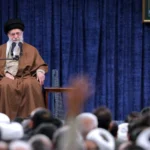Former South Korean Defence Minister Kim Yong-hyun was stopped from attempting to take his own life while in custody over his involvement in the controversial martial law declaration last week, officials confirmed on Wednesday. The situation has intensified political tensions as President Yoon Suk Yeol’s team resisted a police raid on his office.
On December 3, President Yoon imposed martial law in South Korea for the first time in over 40 years. However, the declaration was overturned by lawmakers within hours. The liberal Democratic Party, the main opposition, is now working on a new motion to impeach President Yoon after their first attempt on Saturday failed due to a boycott by ruling party members.
The president’s unexpected move to impose martial law has shaken South Korean politics and impacted financial markets. On Tuesday, prison service commissioner Shin Yong-hae revealed that Kim Yong-hyun tried to take his own life at a detention center in Seoul but was stopped by correctional officers. Mr. Kim is currently in stable condition.
Kim Yong-hyun was arrested on Wednesday on charges of abuse of power linked to the martial law order. Allegations against him include recommending the declaration of martial law to President Yoon and deploying troops to prevent lawmakers from voting on the decree.
On Tuesday, Mr. Kim issued a public apology, taking full responsibility for the martial law decision and pleading for leniency for the soldiers who carried out the orders.
In addition to Kim Yong-hyun, National Police Agency Commissioner Cho Ji-ho and Seoul Metropolitan Police Chief Kim Bong-sik have been detained. They face accusations of using police officers to block parliamentary votes on the matter.
Police Raid Standoff at the President’s Office
South Korean police attempted to raid President Yoon’s office on Wednesday in connection with the case. However, investigators were unable to enter even after six hours of waiting, according to senior officer Lee Ho-young, who briefed parliament.
President Yoon apologised on Saturday, acknowledging his role in the martial law decision and leaving the future course of action to his ruling party. He added that the party would decide on any measures, including those related to his term in office.
The leader of the ruling party later stated plans to coordinate a stable exit for President Yoon while working with the cabinet on state affairs. However, critics have dismissed this proposal as unconstitutional and impractical. The justice ministry has banned President Yoon from leaving the country while investigations are ongoing.
Opposition and International Reactions
Opposition parties and legal experts argue that President Yoon’s declaration of martial law was illegal. Under South Korean law, martial law can only be declared during wartime or in extreme emergency situations. Critics also claim the move was an attempt to suppress political rivals in parliament, which is controlled by the liberal opposition.
North Korea’s state news agency harshly criticized President Yoon on Wednesday, calling him a “traitor” and labeling his military actions as those of “gangsters.” In his initial martial law announcement, President Yoon said the declaration aimed to target “anti-state forces” and “followers of North Korea,” referring to his opposition in parliament.
North Korea is particularly sensitive to reports of anti-government protests in other countries, as such news could influence its own citizens, who are largely cut off from international information.
The political and legal fallout from this crisis continues to create uncertainty, with questions about leadership stability in South Korea amid ongoing tensions with North Korea.





